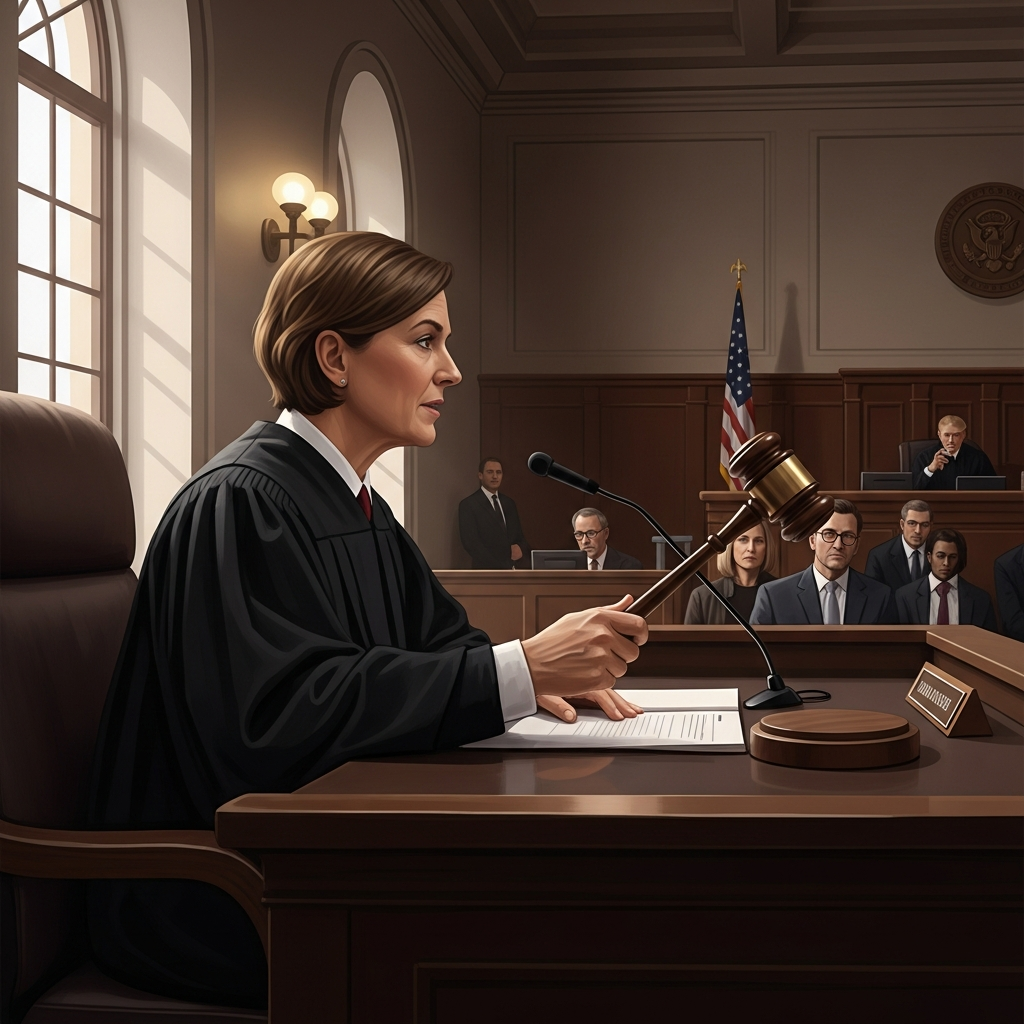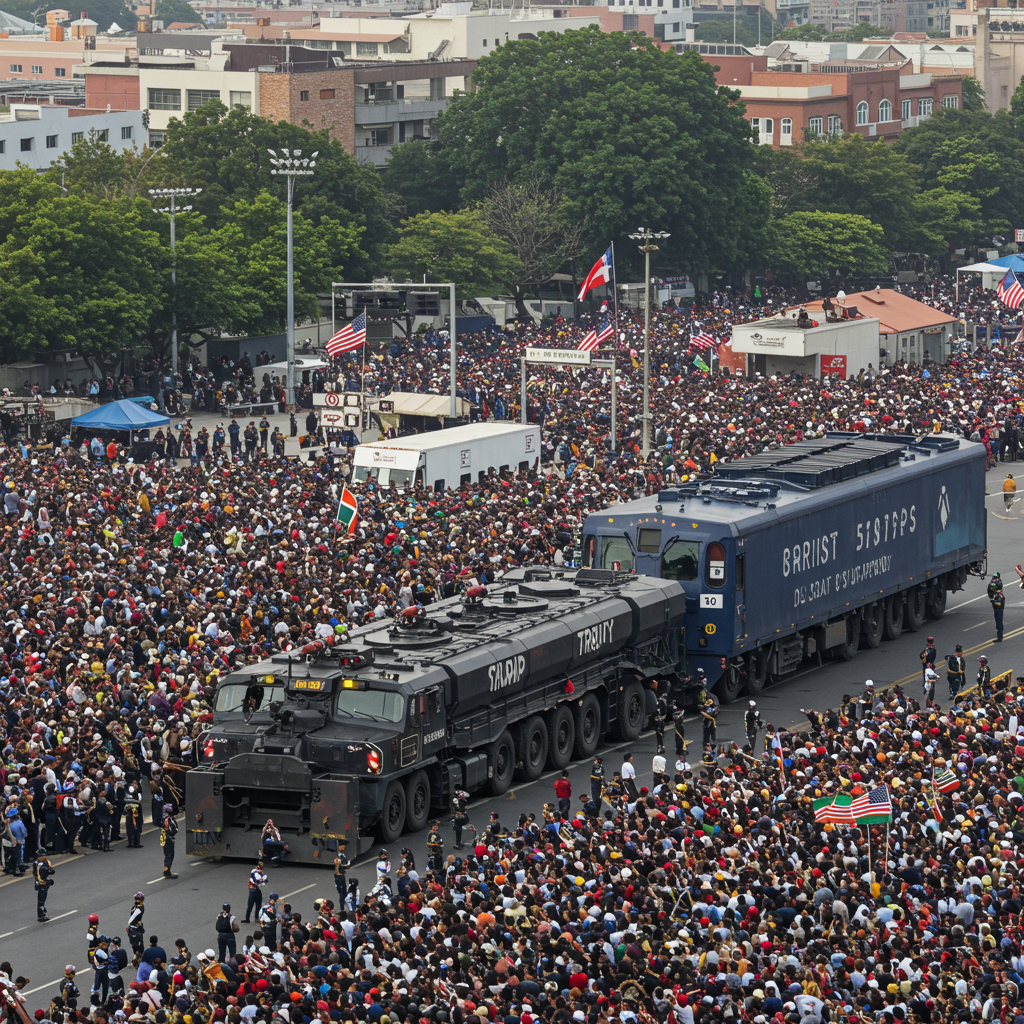A significant legal battle unfolded on November 20, 2025, as a federal judge issued a temporary block on Trump’s D.C. troop deployment, declaring the use of National Guard forces in the nation’s capital “unlawful.” This pivotal decision represents a substantial setback for President Trump’s aggressive strategy of deploying federal personnel in American cities. His administration has consistently argued these actions are necessary to suppress protests, combat rising crime, and safeguard federal property and staff, including ICE agents.
This critical injunction, however, is not an isolated incident. It highlights mounting legal resistance to the executive branch’s authority in deploying troops within local jurisdictions without explicit consent from local governments. The ruling underscores a broader national debate concerning federal overreach versus local autonomy and the foundational principles of civilian policing.
Landmark Decision Halts D.C. Deployment
U.S. District Judge Jia Cobb, an appointee of former President Joe Biden, delivered the decisive ruling that temporarily halted the monthslong Trump’s D.C. troop deployment. She sided unequivocally with District of Columbia Attorney General Brian Schwalb. Schwalb had passionately argued that the President’s actions directly undermined the city’s inherent sovereign autonomy. Furthermore, he contended that the deployment jeopardized public safety by fueling tensions between residents and law enforcement, and inflicted economic harm on the city.
In her written order, Judge Cobb articulated her findings with clarity. “The Court finds that the District’s exercise of sovereign powers within its jurisdiction is irreparably harmed by Defendants’ actions in deploying the Guards,” she stated. This strong declaration emphasizes the court’s view that the city suffered significant, lasting damage. Judge Cobb’s order includes a temporary pause until December 11, granting the Trump administration a critical window to appeal the decision. This period allows time for legal review and potential counterarguments from the White House.
Presidential Justification and Local Rebuttals
The White House, through spokesperson Abigail Jackson, swiftly pushed back against the ruling. Jackson asserted that President Trump was acting “well within his authority to send the Guard to D.C.” She dismissed the lawsuit as a “political stunt” and “nothing more than another attempt – at the detriment of DC residents – to undermine the President’s highly successful operations to stop violent crime in DC.” This statement reflects the administration’s firm stance on the necessity and legality of its deployments.
The D.C. troop deployment commenced in early August. President Trump sent hundreds of troops into the capital without the consent of Mayor Muriel Bowser. He cited a perceived “crime emergency” in the city as his justification. However, local Democratic leaders have consistently and vehemently refuted this claim. They argue that the emergency declaration was unwarranted and lacked factual basis. Despite the stated intent, the deployed Guard personnel in D.C. have often been tasked with patrols and what the administration calls “beautification efforts,” including activities like clearing trash, spreading mulch, and pruning trees.
A National Trend of Legal Pushback Against Deployments
This federal judge ruling in D.C. is far from an isolated incident. It forms part of a series of National Guard deployments and legal challenges that have unfolded across the United States. President Trump’s administration has faced significant and mounting resistance to its efforts to use federal forces in various U.S. cities. Courts have repeatedly pushed back, often deeming the military involvement in domestic matters either unnecessary or unlawful.
Just days prior to the D.C. decision, a Tennessee state judge, Davidson County Chancellor Patricia Head Moskal, issued a temporary block. This ruling halted the mobilization of Guard forces in Memphis. Tennessee Governor Bill Lee had activated these forces at President Trump’s direct request. Plaintiffs argued that Memphis did not meet the state constitution’s strict criteria of “rebellion or invasion” for deploying the Guard. Chancellor Moskal underscored that the Governor’s power as commander-in-chief is “not unfettered,” a sentiment echoing Benjamin R. Farley of the National Immigration Law Center, who hailed it as “one more victory… for the law against executive overreach.”
Other Cities Confronting Federal Deployments
Beyond Tennessee, other federal judges have similarly resisted Trump’s deployments. Over the previous weekend, the Defense Department ordered hundreds of troops to leave Chicago and Portland, Oregon. These withdrawals came after federal courts reached stalemates regarding those particular deployments. Notably, U.S. District Court Judge Karin Immergut previously froze a deployment to Portland. She wrote that limiting military involvement in civilian affairs is “foundational to the safeguarding of our fundamental liberties under the Constitution.”
Elizabeth Goitein, a senior director at the Brennan Center for Justice, observed a consistent pattern. She highlighted that the Trump administration has now been rebuffed by judges in all five cities where Guard troops have been deployed. Goitein asserted that these actions are “not just unprecedented but also unlawful.” She argued they go against centuries of tradition and established legal principles. These rulings collectively reinforce the principle that military deployment within U.S. cities cannot proceed “lawlessly.”
D.C.’s Unique Status and Constitutional Safeguards
Washington D.C.’s unique legal status significantly influences these debates. As a federal district, it is not part of any state, which traditionally grants the President distinct law enforcement powers. However, local officials vigorously contend that President Trump overstepped these constitutional bounds. They argue that his actions unlawfully usurped control over the city’s law enforcement functions. Furthermore, they assert that his deployments directly violated existing laws, such as the Posse Comitatus Act, which prohibit federal military personnel from undertaking civilian police duties.
The lawsuit initiated by D.C. Attorney General Brian Schwalb on September 4th specifically targeted these concerns. It alleged that President Trump’s announcement of the deployment on August 11th effectively supplanted the mayor’s constitutionally defined policing authority. This legal challenge, along with others, demonstrates the ongoing tension between federal executive power and the autonomy of local jurisdictions. It tests long-standing, yet rarely litigated, legal constraints on a president’s authority to utilize troops for domestic law enforcement.
Reaffirming Checks and Balances
Legal and military experts view these court decisions with varying perspectives. Some consider them minor setbacks for the administration’s broader agenda. However, many others see them as vital proof of the system of checks and balances actively at work. Retired Maj. Gen. William Enyart described these events as showcasing the “relative strength of the system and of the founding fathers in designing that system, where we had a separation of powers as well as a balancing of powers.”
The Trump administration continues to challenge these rulings. The deployment case in Chicago, for instance, has been referred to the Supreme Court. National security law professor Chris Mirasola pointed out that a broad Supreme Court ruling in such a case could have significant ripple effects across federal-local power dynamics. Despite the ongoing legal battles, President Trump has continued to suggest deploying troops to other cities, and has warned of potentially invoking the Insurrection Act to facilitate such actions. However, Mirasola also suggested that while courts have limits, “public sentiment” ultimately serves as a stronger and more consequential check on executive power.
Frequently Asked Questions
What was the primary legal justification for Judge Jia Cobb’s ruling against the D.C. troop deployment?
Judge Jia Cobb’s ruling declared Trump’s D.C. troop deployment unlawful based on the argument that it “irreparably harmed” the District of Columbia’s exercise of sovereign powers. D.C. Attorney General Brian Schwalb argued the deployment undermined the city’s autonomy, threatened public safety by stirring tensions between residents and law enforcement, and caused economic damage. The court found that the President’s actions overstepped federal authority, encroaching upon the local government’s constitutionally defined policing functions. This decision affirmed the principle that federal military intervention in local law enforcement must respect the limits of presidential power and local governance.
Which other U.S. cities have seen similar legal challenges to President Trump’s National Guard deployments?
President Trump’s administration has faced significant legal pushback on National Guard deployments in several other U.S. cities. Just before the D.C. ruling, a Tennessee judge temporarily blocked the deployment of state Guard forces in Memphis, which Governor Bill Lee had activated at Trump’s behest. Similarly, federal courts had reached stalemates regarding deployments in Chicago and Portland, Oregon, leading the Defense Department to order troops to withdraw from those cities. These cases collectively illustrate a pattern of judicial resistance to what courts often deem as unnecessary or unlawful military involvement in domestic civil affairs.
What are the broader implications of these court rulings on presidential authority for domestic military deployments?
These recent court rulings, including the injunction against Trump’s D.C. troop deployment, carry significant implications for the balance of power in the U.S. They reinforce the constitutional principle of checks and balances, affirming that a president’s authority to deploy federalized forces domestically is not absolute. Legal experts view these decisions as vital affirmations of civilian control over the military and the autonomy of local governments. While the administration is appealing some of these rulings, potentially to the Supreme Court, the consistent judicial pushback highlights the legal and constitutional limits on executive power when it comes to military involvement in local law enforcement without explicit consent or a clear national emergency.
Conclusion
The federal judge’s temporary block on Trump’s D.C. troop deployment marks a critical moment in an ongoing national debate. This decision, echoing similar legal victories in cities like Memphis, Chicago, and Portland, firmly reaffirms the judiciary’s role as a check on executive power. It underscores the foundational importance of local autonomy and the constitutional constraints on deploying federal military forces in domestic policing roles. As the Trump administration prepares its appeal, the outcomes of these legal challenges will undoubtedly shape future discussions around federal authority, state sovereignty, and the delicate balance of power essential to American governance. The continued scrutiny ensures that military deployments within U.S. cities are not “lawless,” but rather subject to constitutional oversight and judicial review.


